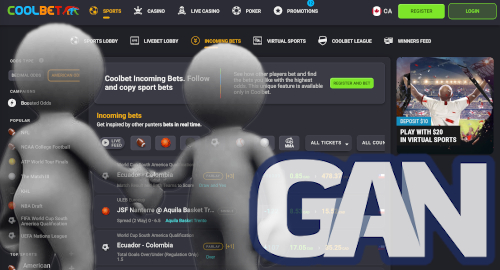 Online gambling technology suppliers GAN have made a bold step to bolster their US market opportunities with the acquisition of customer-facing online operator Coolbet.
Online gambling technology suppliers GAN have made a bold step to bolster their US market opportunities with the acquisition of customer-facing online operator Coolbet.
On Monday, the Nasdaq-listed GAN announced that it had struck a €149.1m deal for Vincent Group plc, the parent company of Malta-based online gambling operator Coolbet. Assuming regulatory approval, the deal is expected to close in Q1 2021.
GAN said the deal involves €80m (US$95m) in cash and the balance in an exchange of GAN ordinary shares. GAN had US$57.5m (€48.5m) in cash and equivalents as of September 30 but the company said it will “seek new capital in the coming weeks” to shore up its balance sheet.
Coolbet generated revenue of €26m last year, with revenue of €18.6m – split roughly 50/50 between sports betting and casino – and earnings of €500k over the first three quarters of 2020. Coolbet, which boasts gaming licenses in Estonia, Sweden and Malta, currently has around 175 staff, mostly based in Tallinn, Estonia.
GAN CEO Dermot Smurfitt said the acquisition was intended to “add a best-in-class sportsbook engine to round out our real money iGaming platform.” GAN is determined to carve out a bigger slice of the rapidly expanding US market by providing “near-turnkey capabilities” to land-based operators looking to make the transition to online betting/iGaming.
The plan is to integrate Coolbet’s offering by H2 2021 but Smurfitt said GAN clients would retain the option of choosing to remain with GAN’s third-party betting vendors or transitioning to the Coolbet product, although Smurfitt hopes clients will choose Coolbet’s “significant competitive advantages.”
Q3 LOSSES MOUNT
GAN investors weren’t overly impressed with the news, as the stock fell nearly 5% in Monday’s after-hours trading. The sell-off followed GAN releasing a third-quarter trading update showing revenue rising 86% year-on-year (+23% from Q2 2020) to US$10.3m during the three months ending September 30. Around 88% of Q3 revenue came from the US market.
Real money iGaming (RMiG) revenue was up 86.3% to $7.7m while Simulated Gaming gained 85.3% to $2.6m. The company credited the RMiG gains in part to ‘multiple deployments’ of its platform in Michigan ahead of state’s imminent launch of online sports betting/iGaming, including GAN’s new partners Churchill Downs Inc and Wynn Resorts.
However, GAN’s cost of sales rose nearly one-third and administrative expenses shot up 255% to $10.4m, largely due to its payroll rising from 141 employees to 215, as well as lingering financial after-effects of the company’s initial public offering this spring.
The effect of these rising costs was a net loss of nearly $4.1m, up from a loss of $1.8m in the same period last year. For the year-to-date, GAN’s net loss stands at $12.4m, up from just $1.54m through the first nine months of 2019.
GAN took a hit midway through Q3 as FanDuel shifted its sports betting operations to its ‘proprietary digital wallet’ at the end of August. Smurfitt said the timing meant GAN “missed the September ramp-up” for NFL betting but online casino revenue had remained “fairly consistent” in terms of market share.